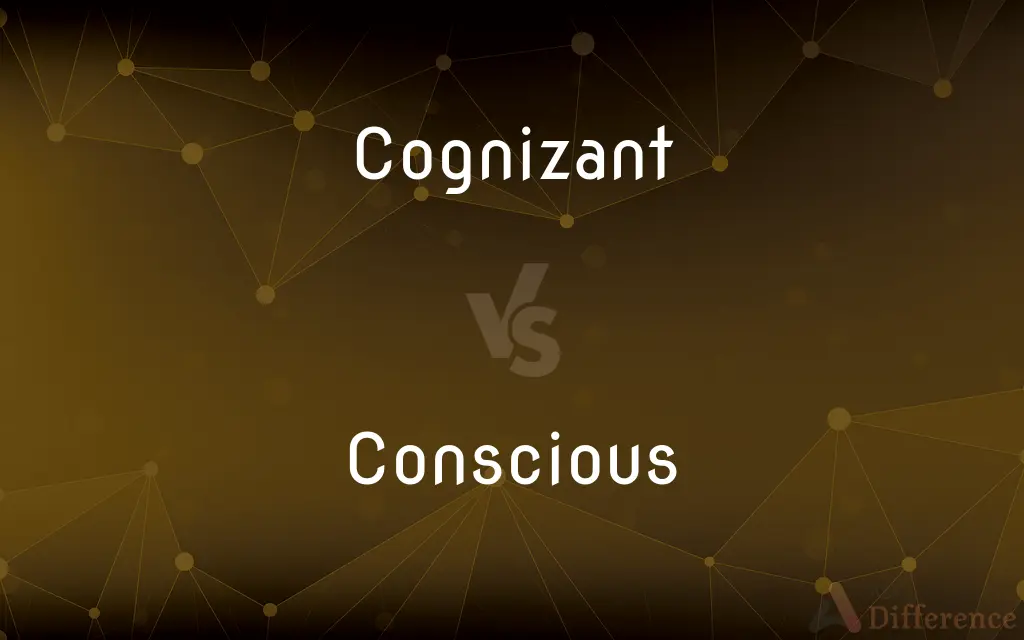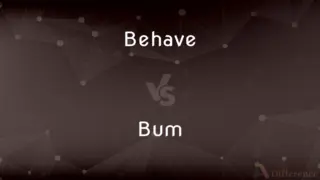Cognizant vs. Conscious — What's the Difference?
By Maham Liaqat & Fiza Rafique — Updated on April 27, 2024
Cognizant implies awareness of particular aspects or facts, whereas conscious refers to general awareness of oneself and surroundings.

Difference Between Cognizant and Conscious
Table of Contents
ADVERTISEMENT
Key Differences
Cognizant refers specifically to being aware of or having knowledge about particular facts or situations. For example, one may be cognizant of the legal implications of an action. Conscious, on the other hand, encompasses a broader awareness, such as being awake and able to understand what is happening around oneself. This general consciousness includes self-awareness and the perception of external stimuli.
Cognizant often implies an understanding that requires specific attention or focus. A person might be cognizant of market trends affecting their business. Consciousness, meanwhile, does not necessarily require focused attention; it refers more to a state of mind in which one is awake and aware.
In legal or formal contexts, being cognizant can imply a responsibility or acknowledgment of certain facts, which can influence decisions and actions. Conversely, being conscious involves basic mental and physiological processes that enable awareness and responsiveness to one's environment and experiences.
While cognizant can suggest a deliberate awareness or educated knowledge about something, conscious can also refer to immediate sensory experiences or the presence of mind in the current moment. For example, being conscious of a pain differs from being cognizant of the reasons for that pain.
Understanding the difference between these terms can affect communication, especially in professional or clinical settings. Knowing whether a person is simply conscious (awake) or cognizant (informed and aware) can influence approaches in healthcare, law, and education.
ADVERTISEMENT
Comparison Chart
Definition
Being aware of specific facts or situations
General state of awareness and wakefulness
Focus
Specific and directed awareness
Broad and general awareness
Usage Context
Often used in formal, legal, and educational contexts
Commonly used in everyday language and medical settings
Implication
Implies responsibility or acknowledgment
Refers to basic mental states or physiological wakefulness
Example
Being cognizant of one's rights
Being conscious of one's surroundings
Compare with Definitions
Cognizant
Acknowledging understanding or knowledge.
They were cognizant of the risks involved in the procedure.
Conscious
Awake and responsive to stimuli.
After the surgery, the patient was fully conscious.
Cognizant
Aware of specific information.
She was cognizant of the company’s financial difficulties.
Conscious
Intentionally aware or deliberate.
She made a conscious effort to be more inclusive.
Cognizant
Informed, especially in a formal context.
He remained cognizant of the confidentiality agreement.
Conscious
Pertaining to the mind’s awareness.
Conscious thought differs significantly from subconscious processes.
Cognizant
Sensitive to.
The council is cognizant of the community's concerns.
Conscious
Relating to perceptions or feelings.
He was conscious of a growing sense of unease.
Cognizant
Mindful or conscious of something.
Be cognizant of the deadlines.
Conscious
Aware of one's own existence, thoughts, or surroundings.
He was suddenly conscious of how others might perceive his actions.
Cognizant
Cognizant is an American multinational technology company that provides business consulting, information technology and outsourcing services. It is headquartered in Teaneck, New Jersey, United States.
Conscious
Aware of and responding to one's surroundings
Although I was in pain, I was conscious
Cognizant
Fully informed; conscious.
Conscious
Having knowledge of something
We are conscious of the extent of the problem
Cognizant
; fully informed; having understanding of a fact.
The defendant is cognizant that this is a serious charge.
Conscious
(of an action or feeling) deliberate and intentional
A conscious effort to walk properly
Cognizant
; self-aware.
Conscious
Characterized by or having an awareness of one's environment and one's own existence, sensations, and thoughts.
Cognizant
Having cognizance or knowledge. (of).
Conscious
Mentally perceptive or alert; awake
The patient remained fully conscious after the local anesthetic was administered.
Cognizant
(usually followed by `of') having knowledge or understanding;
Our youth are cognizant of the law
I am well aware of his limitations
Conscious
Capable of thought, will, or perception
The development of conscious life on the planet.
Conscious
Subjectively known or felt
Conscious remorse.
Conscious
Intentionally conceived or done; deliberate
A conscious insult.
Made a conscious effort to speak more clearly.
Conscious
Inwardly attentive or sensitive to something
As he spoke, he became increasingly conscious of his high-pitched voice.
Conscious
Showing awareness of or preoccupation with something. Often used in combination
A cost-conscious approach to health care.
A value-conscious shopper.
Conscious
In psychoanalysis, the component of waking awareness perceptible by a person at any given instant; consciousness.
Conscious
Alert, awake; with one's mental faculties active.
The noise woke me, but it was another few minutes before I was fully conscious.
Conscious
Aware of one's own existence; aware of one's own awareness.
Only highly intelligent beings can be fully conscious.
Conscious
Aware of, sensitive to; observing and noticing, or being strongly interested in or concerned about.
I was conscious of a noise behind me.
A very class-conscious analysis
Conscious
Deliberate, intentional, done with awareness of what one is doing.
Conscious
Known or felt personally, internally by a person.
Conscious guilt
Conscious
(rare) Self-conscious, or aware of wrongdoing, feeling guilty.
Passage=They found Aunt Carrol with the old lady, both absorbed in some very interesting subject ; but they dropped it as the girls came in, with a conscious look which betrayed that they had been talking about their nieces.
Conscious
The part of the mind that is aware of itself; the consciousness.
Conscious
Possessing the faculty of knowing one's own thoughts or mental operations.
Some are thinking or conscious beings, or have a power of thought.
Conscious
Possessing knowledge, whether by internal, conscious experience or by external observation; cognizant; aware; sensible.
Her conscious heart imputed suspicion where none could have been felt.
The man who breathes most healthilly is least conscious of his own breathing.
Conscious
Made the object of consciousness; known to one's self; as, conscious guilt.
With conscious terrors vex me round.
Conscious
Intentionally conceived;
A conscious effort to speak more slowly
A conscious policy
Conscious
Knowing and perceiving; having awareness of surroundings and sensations and thoughts;
Remained conscious during the operation
Conscious of his faults
Became conscious that he was being followed
Conscious
(followed by `of') showing realization or recognition of something;
Few voters seem conscious of the issue's importance
Conscious of having succeeded
The careful tread of one conscious of his alcoholic load
Common Curiosities
Is being cognizant enough to imply understanding?
Being cognizant implies an awareness that may or may not include a deep understanding, depending on the context.
Does consciousness affect behavior?
Yes, a person’s state of consciousness can significantly affect their behavior and reactions.
What does it mean to be cognizant in a legal sense?
In a legal context, being cognizant often means being aware of the law or specific legal responsibilities.
Can someone be conscious but not cognizant?
Yes, someone might be conscious (awake) without being cognizant (fully aware or informed) of specific details or implications.
How do medical professionals use the term conscious?
Medical professionals use the term conscious to describe a patient’s general state of awareness and responsiveness.
Is it possible to be conscious of something subconsciously?
While subconscious processes are underlying, one can become consciously aware of such influences over time.
Can animals be considered conscious?
Yes, many animals are considered conscious to the extent that they exhibit awareness of their environment.
What does it mean to make a conscious decision?
Making a conscious decision involves deliberate thought and awareness of the options and consequences.
How does being cognizant affect decision-making?
Being cognizant can lead to more informed and, ideally, better decision-making by understanding all relevant factors.
How does culture influence what we are conscious or cognizant of?
Culture shapes our focus, values, and the information we are exposed to, thus influencing our consciousness and cognizance.
What makes someone cognizant of social issues?
Being informed, educated, or directly affected can make someone cognizant of social issues.
What role does consciousness play in learning?
Consciousness allows individuals to be aware of and reflect on learning processes, enhancing understanding and retention.
Can you be cognizant without being conscious?
No, cognizance typically requires consciousness, as it involves being aware of specific facts or situations.
What is the relationship between consciousness and cognition?
Consciousness and cognition are interconnected; consciousness encompasses awareness and wakefulness, while cognition involves the processes of acquiring knowledge and understanding.
How do we become more cognizant of our own biases?
Through self-reflection, education, and exposure to diverse perspectives, we can become more cognizant of our biases.
Share Your Discovery

Previous Comparison
Behave vs. Bum
Next Comparison
Platina vs. PlatinumAuthor Spotlight
Written by
Maham LiaqatCo-written by
Fiza RafiqueFiza Rafique is a skilled content writer at AskDifference.com, where she meticulously refines and enhances written pieces. Drawing from her vast editorial expertise, Fiza ensures clarity, accuracy, and precision in every article. Passionate about language, she continually seeks to elevate the quality of content for readers worldwide.














































